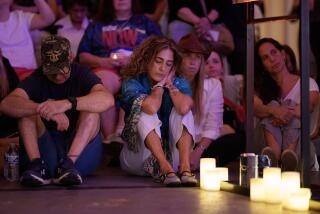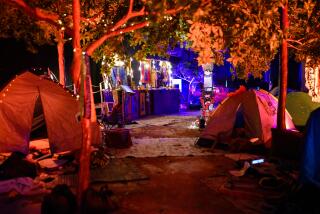Madonna’s Pilgrimage Throws Israel Into a Tizzy
- Share via
JERUSALEM — Plenty of people who find themselves in the midst of a spiritual quest are drawn to the Holy Land, seeking solace and inspiration in its soaring basilicas and stony biblical landscapes, its ancient shrines and rock-hewn temples.
Of course, not all such seekers bring along an entourage of 1,000-plus fellow acolytes and assorted hangers-on. Or take over an entire seafront luxury hotel, swearing its staff to secrecy. Or trigger Israel’s largest police-protection operation for a visiting dignitary in recent memory. Or manage to simultaneously scandalize tradition-bound Orthodox rabbis and left-wing peace activists.
For the record:
12:00 a.m. Sept. 24, 2004 For The Record
Los Angeles Times Friday September 24, 2004 Home Edition Main News Part A Page 2 National Desk 1 inches; 52 words Type of Material: Correction
Western Wall -- An article in Monday’s Section A about a visit to Jerusalem by pop star Madonna described the Western Wall in the Old City as the sole remnant of the Jews’ Second Temple. It is the principal remnant of the temple complex accessible to worshipers, but other archeological elements survive.
But then again, Madonna is no ordinary pilgrim.
Raised as a Roman Catholic, the 46-year-old singer is an avid follower of cabala, the centuries-old Jewish mystical tradition recently popularized in the West, taking particularly strong root in Hollywood -- a phenomenon that has left many in Israel thoroughly bemused.
The pop diva’s visit began Wednesday, as Israelis were ushering in Rosh Hashana, the Jewish new year. Though most of her stay has been spent in seclusion, and has overlapped with a near-shutdown of the country for the holiday weekend, the Israeli press -- known for gleefully skewering anyone and anything with the slightest whiff of pretension -- has been having a field day.
“Hail to the Queen,” read one headline, punning on Madonna’s adoption of the Hebrew name of Esther, the biblical Persian queen and Jewish heroine whose name is believed to have been derived from the word for “star.”
Some of the criticism has been harsh. “True, cabala is far from an exact science, but the connection between it and the ‘cabala’ of Madonna and the dubious characters associated with it is about the same as the connection between astronomy and astrology,” religious-affairs commentator Eliahu Salpeter wrote in the Haaretz daily.
But study of the cabala -- a grouping of texts that was long the province of distinguished, aged and exclusively male Jewish scholars -- has gained ground recently among younger and decidedly secular Israelis, many of whom were exposed to Eastern mystical traditions during post-army service travels to places like India and Thailand.
Some observers noted no small measure of irony in the fact that an entertainer who made a name for herself by combining religious imagery and sexual provocation is now engaged in what those around her describe as a deeply personal and heartfelt spiritual journey.
But the circus-like trappings of celebrity have followed her everywhere -- including to Judaism’s holiest shrine. Madonna tried to make a predawn pilgrimage Sunday to the Western Wall in Jerusalem’s Old City, which is held to be the sole remnant of the Jews’ Second Temple. But a jostling mob of photographers made it impossible for the singer to leave her car, witnesses said.
She did manage, however, to make a candlelit visit to the grave of a Jewish sage, Rabbi Yehuda Ashlag, the author of a revered cabala commentary. Devotees of cabala believe that such pilgrimages will help them achieve their hearts’ desires.
Israeli news reports described the singer, accompanied by a small group including her husband, Guy Ritchie, reciting blessings at the hillside grave in Jerusalem’s Givat Shaul cemetery, while black-clad police escorts stood by with assault rifles.
The high-profile visit was like manna from heaven to Israel’s hard-pressed tourist industry.
Tourism Minister Gideon Ezra was among the dignitaries at a televised gala Sunday at Madonna’s Tel Aviv hotel, where he presented her with a Byzantine-era oil lamp and thanked her profusely for coming.
Madonna, clad in a slinky, low-cut, leopard-print dress, told the gathering that prior to her visit she had been worried by news reports about suicide bombings and other attacks. But, she said, “I realize now that it is no more dangerous to be here than it is in New York.”
Still, parts of the singer’s itinerary were said to have been altered because of controversy or logistical difficulties. One planned stop had reportedly been Rachel’s Tomb, a grim, heavily fortified enclave in the West Bank town of Bethlehem where Jewish worshipers arrive in armored buses and Israeli soldiers keep constant watch. Many Palestinians living nearby have been forced to flee their homes.
Peace activist Angela Godfrey-Goldstein urged Madonna in an open letter not to visit “the heart of the occupied territory ... a closed-off prison, a ghetto whose civilians have no work, no freedom, no life.”
Outside her hotel, the singer’s die-hard fans have camped out around the clock in hopes of catching a glimpse of her.
“I came to see the queen,” said Liron Suliman, 18. “I’m going to be drafted very soon. It’s a nice memory to have ... before going into the army.”
Special correspondent Tami Zer in Tel Aviv contributed to this report.
More to Read
Sign up for Essential California
The most important California stories and recommendations in your inbox every morning.
You may occasionally receive promotional content from the Los Angeles Times.










